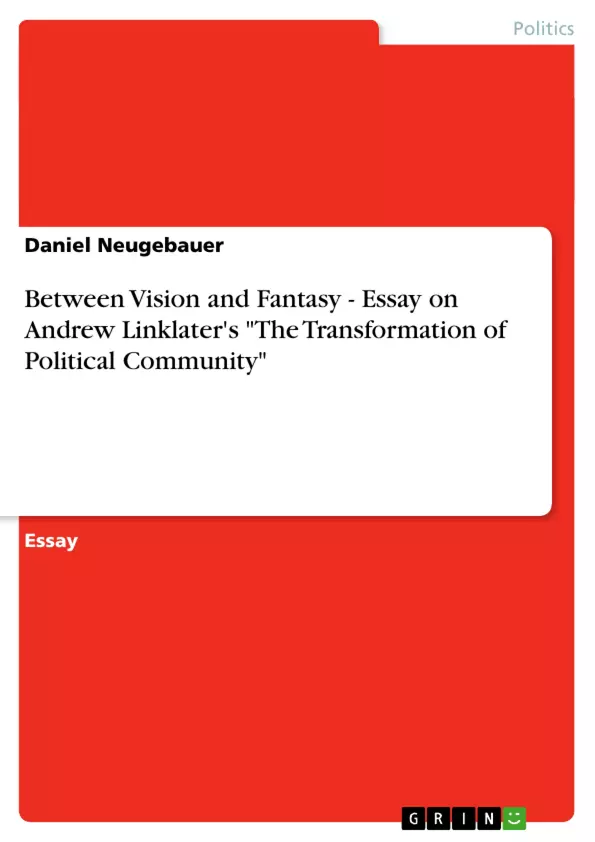Writing an essay about Andrew Linklater’s „The Transformation of Political Community“ is, in light of the pre-eminent praise it received in the academic sphere, a distinct challenge. Is it actually possible to make critical statements about a book, which others have called “one of the most important books in international theory published in this decade”, or even “the most impressive work of international theory to have been produced in Britain since Bull’s Anarchical Society”? The mere quantity of laud is as impressive as its quality. One easily tends to follow this blandishment, and ignores that it is not more than base flattery.
Beyond doubt, Linklater has produced a sound book, which has – after his preliminary publications “The Problem of Community in International Relations” in 1990 and “The Question of the Next Stage in International Relations: A Critical-Theoretical Point of View” in 1992 – made him one of the strongest voices in contemporary international relations theory. I hypothesize that “The Transformation of Political Community” has already today, only nine years after its first publication, become a classic of international relations.
What defines a classic? Two factors are decisive, and they are the same for a classic in international relations than they are for a classic car: It is cherished by people, and it has a unique selling point, something that differs from everything that has been produced before. Using this definition, an Aston Martin DB 5 is a classic as well as Kenneth Waltz’s “Man, the State, and War”. A classic, as complete and coherent it might be, is not necessarily without problems. Several times, Aston Martin went bankrupt (and was reborn again), and for Waltz’s neorealism the sudden and peaceful collapse of the Soviet Union meant the end of its universal validity.
Inhaltsverzeichnis (Table of Contents)
- Introduction
- 1. The post-westphalian political community
- 2. The need to draw a distinction…
- 3. The test of applicability
- 4. Conclusion
Zielsetzung und Themenschwerpunkte (Objectives and Key Themes)
This essay examines Andrew Linklater's "The Transformation of Political Community", evaluating its contribution to international relations theory and assessing the applicability of its central concept, the post-westphalian political community. The essay argues that Linklater's work offers a unique and valuable perspective on the evolving nature of political communities in a globalized world.
- The critique of the Westphalian state system
- The concept of the post-westphalian political community
- The transformation of political community through respect for cultural differences, reduced material inequalities, and universality
- The role of dialogue and consent in building political community
- The challenge of overcoming social exclusion and moral deficits within communities
Zusammenfassung der Kapitel (Chapter Summaries)
- Introduction: This section introduces the essay's central research question: Is Linklater's concept of the post-westphalian political community an applicable contribution to international relations theory? The introduction also highlights the significance of Linklater's work and the potential of his ideas to become a classic in the field.
- 1. The post-westphalian political community: This chapter delves into Linklater's rejection of the traditional interstate order and his vision of a "universal communication community" built on dialogue and consent. The chapter explores the characteristics of this new community, including its focus on inclusion and its efforts to address social exclusion and moral deficits within societies.
- 2. The need to draw a distinction…: This chapter examines how Linklater's concept of the post-westphalian political community distinguishes itself from existing theoretical perspectives. It assesses the originality and contribution of his ideas to international relations theory.
- 3. The test of applicability: This chapter analyzes the real-world applicability of Linklater's ideas. It explores the practical implications of his proposed transformation of political community and its potential to address global challenges.
Schlüsselwörter (Keywords)
This essay focuses on the key concepts of post-westphalian political community, globalization, social fragmentation, universal communication community, dialogue, consent, inclusion, exclusion, moral deficits, cosmopolitanism, and transformation of political community. The essay also explores the theoretical underpinnings of Linklater's work, drawing on constructivism and sociological perspectives.
- Citar trabajo
- Daniel Neugebauer (Autor), 2007, Between Vision and Fantasy - Essay on Andrew Linklater's "The Transformation of Political Community", Múnich, GRIN Verlag, https://www.grin.com/document/73271



